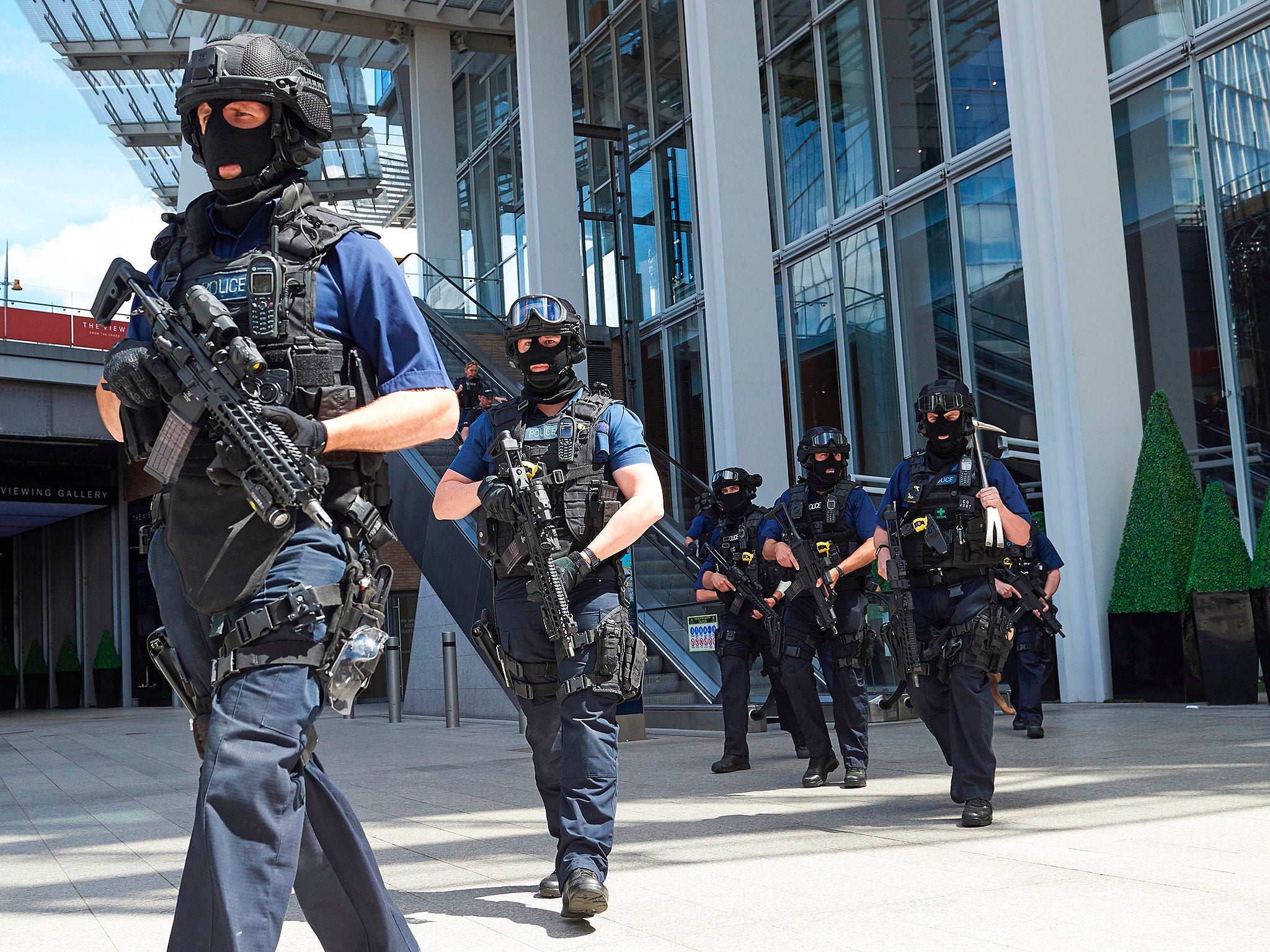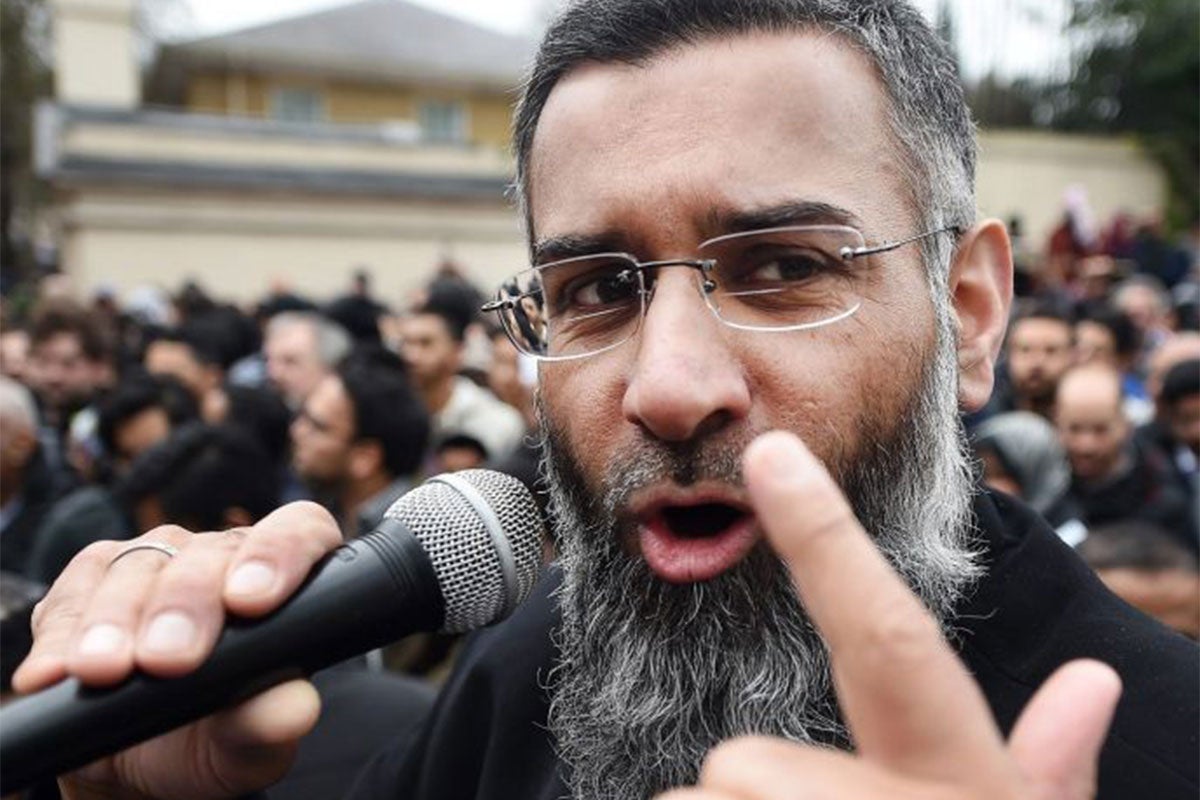UK terror threat from Isis and right wing groups 'not diminishing', top prosecutor warns
Sue Hemming says recent increase in terror cases is home-grown amid fears over returning fighters

The terror threat to the UK shows no sign of decreasing “any time soon”, a top prosecutor has warned amid record arrests.
Sue Hemming, head of the Crown Prosecution Service’s (CPS) counter-terror division, said although the increase has mostly been driven by Isis and other Islamist groups a spike in right-wing extremism is also to blame.
“Now, more than ever, we need to work together to maximise our ability to tackle the threat,” she told the National Security Summit in London.
“Terrorism is not new to this country but the current threat does not appear to be diminishing any time soon.
“Resources are scarce, but we will continue to do our best to protect people here and abroad, and ensure we have the right strategy and tools to do so.”
More people were arrested on suspicion of terror offences in the past financial year than ever recorded before, with 79 trials prosecuted in the same year at a conviction rate of 86 per cent.
Most defendants were prosecuted with “preparation” for terrorist acts, which can include terror plots or planning to travel to Isis territories in Syria and Iraq.

The number of people charged with joining a banned group, like Isis or the neo-Nazi terrorist organisation National Action, has also increased alongside those for encouraging terrorism and distributing extremist material.
Ms Hemming said the CPS has doubled its counter-terror staff to deal with the workload, while recruiting more prosecutors to brace for a continued rise.
“Cases emerging from the conflict in Syria and the emergence of Daesh [Isis], together with the more recent terrorist attacks, have resulted in a substantial increase in the number of prosecutors dealing with terrorism cases,” she added.
The prosecutor said a “significant number of cases” since 2013 were linked to foreign terrorist fighters who have either travelled to Syria and returned, or been prevented from going.
“However more recently, the increase has been in activity at home,” she added.
“Much of the increase has been from Daesh or similarly inspired activity, but we have also seen an increase in extreme right-wing activity from organisations like National Action who have been recently proscribed.
“This can be demonstrated in part by the increase in terrorism arrests for those who identify themselves as from ‘white’ ethnic groups.”
Ms Hemming warned that many cases require evidence from abroad, which is impossible with nations like Syria that have no functioning criminal justice system, leaving prosecutors relying on unreliable digital media to prove guilt.
Debate has been intensifying on how the UK should punish or rehabilitate convicted terrorists, as well as how to treat those returning from the battlefield.
Figures released this week estimated that 425 British men, women and children have so far returned from Isis territory and the fate of 400 others who joined the self-declared caliphate remains unclear.
Max Hill QC, the independent reviewer of terrorism legislation, called for a focus on “reintegration” in cases where authorities decide returnees should not face prosecution and said that those in a “state of utter disillusionment” could be diverted away from criminal courts.
In a speech earlier this week, Mr Hill warned against a “knee-jerk reaction” to the terror attacks in Westminster, Manchester, London Bridge, Finsbury Park and Parsons Green as he raised concerns about Government plans for new laws.
Responding to proposals to jail people who repeatedly view terrorist content online for up for 15 years, he warned there must be “very careful work” to stop innocent people being pursued.
Mr Hill said “thought without action or preparation for action” must not be criminalised, adding: “Legislating in the name of terrorism when the targeted activity is not actually terrorism would be quite wrong…we must be vigilant against any future instances of ‘knee-jerk, something must be done’ lawmaking.”
In a previous interview with The Independent, the watchdog said “in an ideal world we wouldn't have specific terror offences”, arguing crimes can be adequately handled by pre-existing laws.
In what appeared to be a veiled jab on Wednesday, Ms Hemming said “we must recognise that specific counter terrorism powers are necessary”.
“Prosecutors regard those who commit terrorist offences as criminals,” she added.
“Acting early to safeguard public safety means that traditional investigative powers are not always sufficient, and prosecutors need offences available to prosecute those who rightly need to be brought to justice, where traditional criminal offences do not fit conduct that rightly calls for punishment.”
Mr Hill has argued that the use of specific terror offences has worsened the perception of bias against the Muslim community that threatens to worsen cooperation with authorities, and that new laws could have human rights implications.

But Ms Hemming said: “There is no conflict between having appropriate laws and powers to protect national security and acting in a way that safeguards human rights, provided we tackle all types of terrorism in the same way.”
She added more may need to be done to increase trust across communities and show that the CPS is not differentiating between motives or targeting certain groups unfairly.
“Whilst not every terrorist allegation will need a prosecution, the seriousness will often make it more likely than not that prosecution will take place in a terrorism case,” the prosecutor said.
She noted that normal criminal offences could be charged “with a terrorist connection” as was the case with the Islamist murder of Lee Rigby and far-right killing of Jo Cox.
New guidance from the Sentencing Council could see punishments intensified for suspects using cars and knives, or for offences that recent attacks have shown to be “more serious than previously perceived”.
Authorities in London said they are “working relentlessly” to prevent future atrocities after considering the results of a review by Lord Harris.
Sadiq Khan, who commissioned the inquiry after being elected mayor last year, said two thirds of the 127 recommendations had been implemented and blamed the Government for “dragging its feet” on those outstanding.
Lord Harris’ review – published five months before the Westminster attack – warned of the risk of vehicle rammings and called for barriers to protect potential targets, but the Home Office has not yet confirmed the requested funding.
The Government has since commissioned a separate review by David Anderson QC into how police and security services responded to this year’s attacks to see whether “lessons can be learned”.
A spokesperson for Downing Street said: “As we have seen painfully in the UK this year, we face an unpredictable threat from terrorism. We have to tackle the ideologies that drive or inspire these kinds of attacks.
”That is why we are doing things like establishing a new commission on countering extremism to help expose all forms of extremism and division and to challenge those who preach hate.
“What we want to do is to send a clear message that we will not tolerate terrorism, those who help radicalise terrorists with their extremist views, or those who turn a blind eye to terror.”
Bookmark popover
Removed from bookmarks